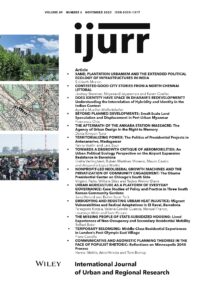The goal of this research is to understand the spaces Dharavi’s inhabitants require to sustain existing socioeconomic systems and how future redevelopment in the area can facilitate their inclusion. In India, livelihoods are directly linked to identity, as religion or caste often define the trades that individuals practise. Mumbai is the country’s financial capital, and Dharavi is its most famous informal settlement, with internationally reputed commercial enterprises reflecting such socioeconomic patterns. In this article I therefore examine how identity—created through factors such as religion, caste, occupation, language and ethnicity—is interlinked with space in the settlements’ hybrid fabric. I use a case study of a leather manufacturing complex to exemplify this correlation. Interviews with the business owner were combined with fieldwork to document the unit’s establishment in the settlement and its current production processes. Based on these data, essential spaces were identified and methods of integrating them into the upcoming redevelopment project were explored through the lens of hybridity. The research is relevant not just for the redevelopment of informal settlements in Mumbai but also for promoting inclusive urban development that caters to the vast range of user requirements, from the level of the individual to that of cities across the globe.
Details
Written by:
Ayesha Mueller-Wolfertshofer
Digital Object Identifier (DOI)
https://doi.org/10.1111/1468-2427.13360
About DOI

